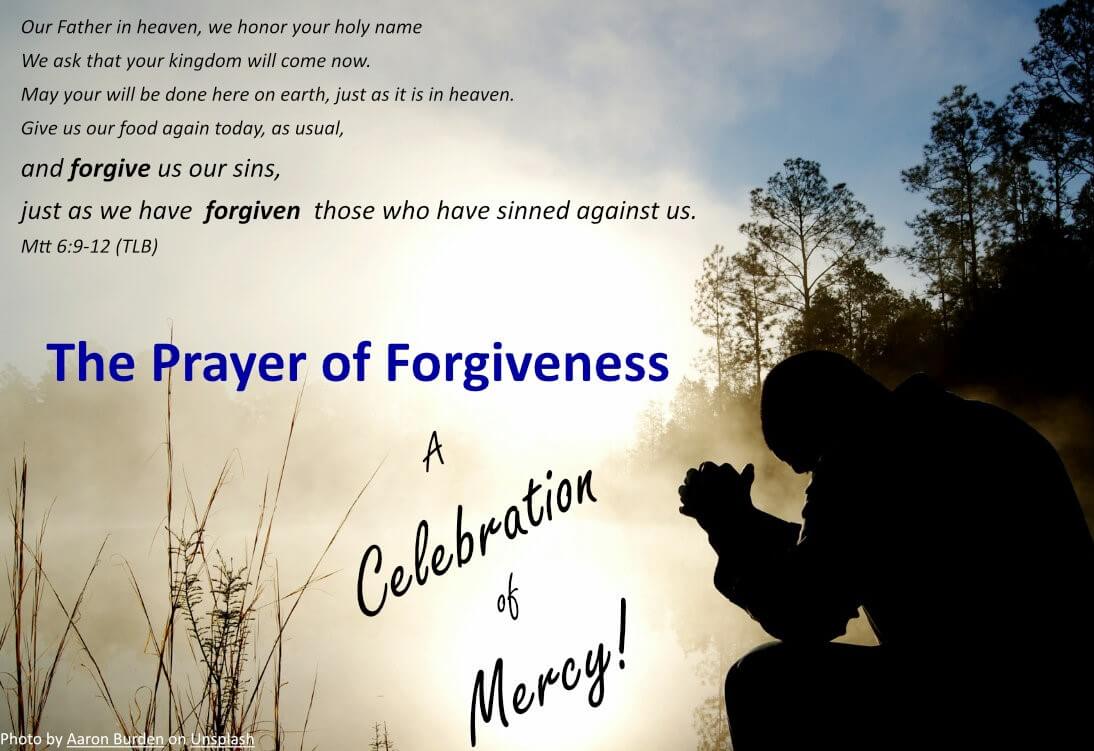Jesus’ disciples wanted a prayer life beyond what they were used to; a prayer life more like his. So, they asked for his help. Jesus gave them a ‘truth package’ we refer to as ‘The Lord’s Prayer’ (see my post, Don’t bring us into temptation). One truth they were to unpack was the prayer of forgiveness.
Why did Jesus give the prayer of forgiveness such a high profile?
Constant admiration of the Father
The Lord’s Prayer opens with an eternal worship theme: the Father’s holiness.
Then, four asking points. Each one triggers admiration of something wonderful about the Father. It should be true of any prayer request. In every need, or situation requiring God’s help, there will always be a signpost pointing us down an avenue of wonder and worship of the Father. Of course, we might miss the signpost in our hurry to do our asking.
As we ask the Father (from Mt 6:9-13):
- For his kingdom to come, it draws us into the praise of his eternal power and authority.
- For his daily provision, we celebrate his faithful care.
- For his forgiveness, we overflow with thanks for his great mercy.
- To keep us from temptation and deliver from evil, we exalt him as our constant Protector.
About those asking points…
There are so many things Jesus could have included in his ‘what to ask the Father for’ package. But, after the priority request (for the Kingdom to come) and the critical one (for daily food), he brings in the forgiveness point. Jesus wanted his disciples to understand the high value the Father places on prayer that asks and releases forgiveness.
…and forgive us our sins, just as we have forgiven those who sin against us. (Mt 6:12 TLB)
The Father’s mercy is as immense as his love for us and is the basis for any prayer of forgiveness. Praying for forgiveness is more than a confession of sin. It’s a celebration of the Father’s full mercy given to us in Jesus Christ!
In our eternal Home, our praise of the Father’s mercy will transcend the songs of angels. It will include passionate, unending worship by grateful fallen ones who have been forgiven and restored. We will be a brilliant display of what the Father’s mercy accomplished through Christ. There will be no sin, so never again an occasion to ask for his forgiveness.
The prayer of forgiveness is for this present life. We agree with the Father about our imperfection; we admit our flaws and grieve when we fail him. As Christ’s chosen Bride, we cherish unbroken intimacy with him, and are quick to resolve anything that mars that union. But it’s not joyless introspection. In asking and receiving forgiveness, we are drawn into a celebration of the Father’s great mercy!
Embedding the celebration of mercy in our prayer life affects our response to the faults of others. Keeping our hearts free from offence doesn’t hinge on receiving an apology or their admission of wrong. We release forgiveness as an extension of our celebration of the Father’s mercy toward us.
Some find it useful to use a particular daily prayer format, which includes a section for confession of sin. There are two cautions: (1) It can become a routine, general request for the forgiveness of sins, without talking to the Father about specific failures. (2) By reserving the prayer of forgiveness for a particular ‘set’ prayer time, we miss the immediacy of agreeing with the Father about a sin or omission when it happens, or as soon as we are aware of it. We are imperfect (we fail), but aim to live blamelessly (dealing with a failure as the Spirit alerts us to it). So, we hold the prayer of forgiveness close, honouring the high value Jesus placed on it in the prayer model he gave his disciples.
- Our Father in heaven, hallowed be your name. Our view of the Father’s holiness affects our gratitude for his mercy. Ponder these two truths, then take time to admire (praise, celebrate, give thanks for, desire and declare) both the holiness and the mercy of the Father.
- Read 1 Th 4:1. Tell the Father of your longing to please him more and more, and of your desire to be sensitive to his Spirit’s alerts about what honours or dishonours him. Ask for his help to not miss the prayer of forgiveness moments when aware of a failure.
- Habits don’t happen suddenly; they form gradually through repeated practice (disciplines). Visual or audible reminders can be a helpful aid in our busy day, triggers that prompt us to review the past hour(s) and, if needed, offer a prayer of forgiveness. These brief reviews during the day increase our sensitivity to the Spirit’s alerts when there’s a need for an immediate, on-the-spot prayer of forgiveness.




